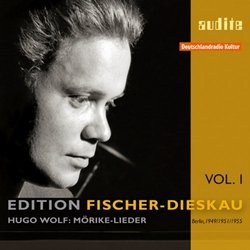| All Artists: Dietrich Fischer-Dieskau, Hugo [Composer] Wolf, Hertha Klust, Rudolf Wille Title: Hugo Wolf: Mörike-Lieder Members Wishing: 0 Total Copies: 0 Label: Audite Original Release Date: 1/1/2008 Re-Release Date: 7/8/2008 Genres: Pop, Classical Styles: Vocal Pop, Chamber Music, Historical Periods, Classical (c.1770-1830) Number of Discs: 1 SwapaCD Credits: 1 UPCs: 422143955991, 4022143955999 |
Search - Dietrich Fischer-Dieskau, Hugo [Composer] Wolf, Hertha Klust :: Hugo Wolf: Mörike-Lieder
 | Dietrich Fischer-Dieskau, Hugo [Composer] Wolf, Hertha Klust Hugo Wolf: Mörike-Lieder Genres: Pop, Classical
|
Larger Image |
CD Details |
CD ReviewsAn intimate radio broadcast by the thirty-year-old Fischer-D Santa Fe Listener | Santa Fe, NM USA | 06/05/2010 (4 out of 5 stars) "At present Fischer-Dieskau has over 450 recordings in the catalog, of which 25 contain songs by Hugo Wolf, of which 15 feature Morike Lieder. For me, that's not an embarrassment of riches, more a chance to find at least one recording where F-D isn't indulging in his well known mannerisms. I gravitate toward his early records, and here we have a radio broadcast, in mono, from 1955, when the baritone turned thirty. The source is the archives of the RIAS (Radio in the American Sector), a rich source of work for postwar German musicians in Berlin. The voice is recorded very close without almost no ambience -- a typical practice over the radio at the time -- with pianist Hertha Lust laced considerably farther back. But F-D adapts to the microphone by singing below what he would have used in a concert hall. The overall effect is intimate and quite listenable.
Indeed, such intimacy is unique in the singer's output of Wolf that I've heard, and since he indulges on no barking at all, hearing him in prime voice is a thorough pleasure. It was Wolf's practice to compose in a frenzy of creativity. He produced 53 Morike songs in 1888, and the collection proved to be the source of his most popular Lieder, second only to his settings of Goethe. F-D sings 18 of them, a relatively skimpy selection, no doubt cut down to fit the length of a radio broadcast (54 min.). But such is the concentrated intensity of Wolf's idiom that the listener hardly feels shortchanged. I would say he also leans toward the more reflective and melancholy side of the Morike output; the rousing, melodramatic Der Feuerreiter isn't included, for example. For those who cannot get enough of Fischer-Dieskau, this broadcast will duplicate later, better-sounding recordings. For those of us who pick and choose, this is definitely an attractive candidate." |

 Track Listings (18) - Disc #1
Track Listings (18) - Disc #1